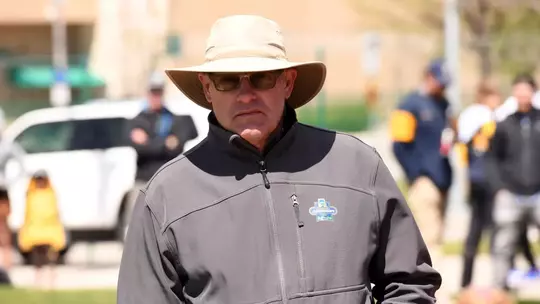
Established Culture Has Rams Ready To Flip Switch
Day-to-Day builds up for the meet which matters
This time of year is supposed to feel different.
Championship season should for everybody, but it can’t be just a date on the calendar when things mysteriously change. There needs to be a build up for it truly to standout. The work has to come prior, or it just won’t matter what an individual or team wants.
There has to be a culture established, which Colorado State’s track and field programs have done under the guidance of Brian Bedard and his staff. Of the past 12 men’s and women’s Mountain West outdoor titles, the Rams have claimed six of them and CSU is an equal-opportunity program with three to each gender.
When the Mountain West Championships start with Wednesday’s multi events in Clovis, Calif., the men will enter as the two-time defending champions, thanks to there being no championship meet in 2020. In 2019, Colorado State claimed both titles.
Bedard knows this has taken time to build, and it’s not a discussion a team has at the beginning of every season. It requires an expectation to be set from the first introductions between coach and athlete.
“I really think it’s a sustainable way of doing things consistently over and over until it’s habit,” he said. “It starts at practice; it probably starts in recruiting, letting kids and parents know what the expectation is going to be with very straight talk. Then it’s the day-to-day practice and not letting things slip, holding athletes and staff accountable and everybody having the same vision and expectation. With that, to help make it sustainable, it has to be, to some degree, enjoyable. You can’t just beat people down every day and expect good results over the long terms. You need to be process-oriented but enjoy the process. You celebrate achievements along the way, teammates and staff.”
Bedard has always told his coaches when they recruit to not sugar-coat anything. He wants an honest picture projected, not just of the facilities where training takes place, but the fundamental philosophy of how things are done.
An important piece of building a culture is inviting in the type of student-athletes who will buy in to the program’s proven mode of operation.
“It starts in recruiting and getting the right kind of kids. That’s where we start to talk about our culture,” Bedard said. “I literally say this is what we do, this is what were about. We’re blue collar, work ethic, great attitude and being coachable, and all of those things are extremely important to us. We’re not about the frills here. It’s bare bones. When I walk into the indoor track, I say this is our Rocky gym. It leaks in the corner, it stinks in here and it’s dirty, but we build champions in here.”
A great message, but he’s also concluded he needs a new delivery.
“None of the kids know who Rocky is,” he joked. “The parents have to do a better job of showing their kids Rocky movies, at least the first one, the good one.”
Track and field can very much become an individual pursuit, and times and distances do matter when an athlete is looking to reach the next level, be it simply being part of the conference roster or looking beyond to NCAA qualifiers and the NCAA Championships themselves.
There is a time and place for that, but it’s not the conference meet, said Lily Tomasula-Martin. This week, there is only one point to get across, and that’s gathering points.
“A lot of the meets are really important, and a lot of us have individual goals, but once it hits conference time and championship season, it doesn’t really matter what your individual goals are in this moment,” she said. “Yeah, if it’s going to better the team, but right now, we’re all going for who is going to pull the most points in this event, who is going to pull those points here and really trying to stack it up no matter what. It’s easy to forget what your individual mindset was going into championship season, because it’s how are we going to make this work best for the team.”
It’s easy to forget what your individual mindset was going into championship season, because it’s how are we going to make this work best for the team.Lily Tomasula-Martin
“A lot of the meets are really important, and a lot of us have individual goals, but once it hits conference time and championship season, it doesn’t really matter what your individual goals are in this moment,” she said. “Yeah, if it’s going to better the team, but right now, we’re all going for who is going to pull the most points in this event, who is going to pull those points here and really trying to stack it up no matter what. It’s easy to forget what your individual mindset was going into championship season, because it’s how are we going to make this work best for the team.”
The team isn’t just the men seeking their title and the women going after theirs, it is about each gender supporting the other. It isn’t the distance kids on one part of the track, the field athletes spread all over and the sprinters doing their thing, it’s about the entire roster supporting each other.
It’s not a request, either. Bedard makes that as clear as anything. If your competition schedule is done as an athlete, you are expected to be the first on the bus to the meet and the last one on it to return to the hotel.
“Our coaches help us a lot. They organize mandatory watches,” sprinter Tom Willems said. “Michael Mooney had a meet, he had to race at 7 p.m., and our coaches demanded everybody be there to watch him. So, it’s also the coaches pulling us along, making sure everyone’s head is straight and everybody gets the time to be appreciated for all the hard work they do.
“At conference, everybody switches on and it’s time to go. You just know it’s there. You can tell Air Force is there because they bring every single person, but I feel the quality of the team beats the numbers. I hear CSU just as much as Air Force when we have half the supporters. It is more of a feeling.”“At conference, everybody switches on and it’s time to go. You just know it’s there. You can tell Air Force is there because they bring every single person, but I feel the quality of the team beats the numbers. I hear CSU just as much as Air Force when we have half the supporters. It is more of a feeling.”
At this point, the athletes will tell you the “mandatory” tag is no more than a reminder for them, as there isn’t any other place they’d rather be in the moment. Track practices are spread out during a day, with different groups hitting the facility at different times, with a bit of crossover.
While there isn’t time for idle chit chat, there is a definite appreciation for what each group is doing.
“It means we all have a common goal at the end of the day, and everybody is fighting for the same thing,” Tomasula-Martin said. “It might look a little different across your events, but it really means we’re going to try to excel at the highest caliber possible across the board.
“That’s the fun part of the season, when you get to Saturday when it’s the 5K and 4x4 left. It’s, OK, I’m going to pull my weight in the 5K, but you don’t leave the track because it’s so exciting watching the 4x4. That’s the way it is across the board. The expectation is you’re there serving for somebody else.”
As ingrained as the culture is within the program, Bedard and the athletes know it requires constant work. None of them are allowed to take it for granted, and for the guy at the top, which includes him.
Bedard is constantly looking at how things are done and noting the subtle changes taking place in the student-athletes, even the world where they currently reside. If nothing else, the global pandemic served as reminder not to overlook any detail.
So, they don’t.
“We’re not the type of team where every single time we get it right. The best thing about it is we have meetings at our track meets and we tell each other what’s wrong,” Willems said. “We tell each other these people are supporting the team, you guys aren’t, and you need to get with it. When it comes to the big events, everybody is there, everyone is cheering, everyone is connected.
“I run for DeVon Washington because he runs for me. It’s the relationship we’ve had the past three years. It’s the relationship that pushes people. Every time I see him do well, I have to one-up him. It’s not just about competition, it’s about having amazing friends. I can talk to anybody here on the team, tell them anything they need to hear, and they can tell me what I need to hear. I don’t think a non-championship team would have very much cooperation. Everything is individual. Here, everything is more connected.”
So, when the Rams talk about flipping the switch for championship week, it’s not in reference to a sudden change in approach. It’s almost a literal reference, where they expect to finally use all the electricity, they’ve built up during the preceding weeks to light up their biggest stage of the season.
Because to be as successful as Bedard’s program has been, the end results must start with the opening pitch. A clever saying won’t make a dent, nor will a fire-and-brimstone pep talk. They have their place, but neither will produce a culture.
Work will, which is the expectation they were all presented from the start.
“I think you can get caught up in phrases on T-shirts or on top of the football field, and it’s all good as long as it’s maintained every day. That’s the hard part,” Bedard said. “You can have these dreams and visions, but if it’s not backed up every day in the daily grind, it’s hollow.”
What isn’t is the trophy case at the Glenn Morris Fieldhouse. Because this time of year just burns a bit hotter for Bedard’s Rams.
As expected.





